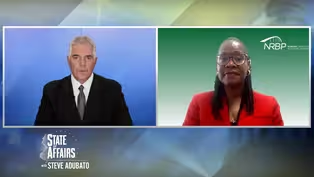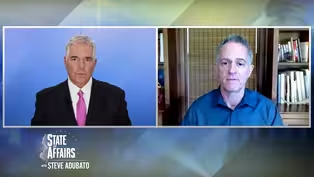State of Affairs with Steve Adubato
Strengthening our democracy through civic engagement
Clip: Season 9 Episode 17 | 9m 40sVideo has Closed Captions
Strengthening our democracy through civic engagement
Harry Pozycki, Founder & Chairman of The Citizens Campaign, talks with Steve Adubato about reigniting civic engagement, combating misinformation, and empowering citizens to strengthen our democracy.
Problems playing video? | Closed Captioning Feedback
Problems playing video? | Closed Captioning Feedback
State of Affairs with Steve Adubato is a local public television program presented by NJ PBS
State of Affairs with Steve Adubato
Strengthening our democracy through civic engagement
Clip: Season 9 Episode 17 | 9m 40sVideo has Closed Captions
Harry Pozycki, Founder & Chairman of The Citizens Campaign, talks with Steve Adubato about reigniting civic engagement, combating misinformation, and empowering citizens to strengthen our democracy.
Problems playing video? | Closed Captioning Feedback
How to Watch State of Affairs with Steve Adubato
State of Affairs with Steve Adubato is available to stream on pbs.org and the free PBS App, available on iPhone, Apple TV, Android TV, Android smartphones, Amazon Fire TV, Amazon Fire Tablet, Roku, Samsung Smart TV, and Vizio.
Providing Support for PBS.org
Learn Moreabout PBS online sponsorship[INSPRATIONAL MUSIC STING] - We're joined once again, it's been way too long, by our good friend, Harry Pozycki, chairman of The Citizens Campaign and founder of The Citizen Service.
Good to see you, Harry.
- Good to see you, Steve.
Thanks for having me.
- Tell folks what The Citizen Campaign is, put the website up so we can see, because I know too much about how great you guys are, let everybody know what you're doing.
- Well, look, we've understood that the power structure in this country is out of whack, too much top down, so we've been developing empowerment training for citizens for years, and a year ago we deployed a new national public service called The Citizen Service, where we recruit, train, and deploy citizens in positions in their own towns that don't require that they run for office and fit their busy lives.
- Hey Harry, let me ask you something.
Well, right before a gubernatorial election, this will air before, possibly even after, 'cause this is Evergreen.
What the heck is the responsibility of New Jersey, and then we'll talk about the nation, New Jersey citizens.
If we want to have the best government we can that serves the people well with a lot of people, loaded question I know, saying "What do you want from me?
"I'm not running for governor."
What do we need from our people?
- Well, I'll tell you.
I think the greatest danger to our democracy, not just here in New Jersey, is disengagement.
People are getting frustrated and feeling like a pox on both your houses, why should I go out and vote?
And we need not only for them to engage, we need them to engage more deeply and with more knowledge of their own power.
- But Harry, you do understand why a significant number of people are so "disengaged."
You do understand that?
- I do.
I think that there's been a failure of both political parties, money-driven elitists, and not really responding to the day-to-day needs of citizens.
But I think we have a responsibility as well.
I think that that's largely due to the fact that we have to some degree disengaged, we look at politics as entertainment, it's grown a political climate of careerism and celebrity as opposed to the climate of service that we used to have.
- But Harry, last time we had you, let's just say there were phones out, there were mobile phones, but they were not as ubiquitous as they are today.
Question.
What is the danger from your perspective of people, too many of us, having an algorithm that the folks who run these social media platforms understand about us, and we simply get back information that reinforces are what we think we believe and then we're told we're right, and it's a long-winded way of getting to this question, How is that not being an engaged citizen who finds out important information that may not comport with what I already think I believe?
- You know, I think that one of the greatest dangers to our democracy has been social media.
I think that right now it's a fact that more than half of the public gets their information from social media and it's riddled with disinformation, conspiracy theories, and the like.
I think the antidote is community.
If you are working and communicating with people whom you know, whom you're going to see again, whom you can determine whether they're trustworthy or not, you can reach fact a lot faster than on social media these days.
- But along those lines there are communities.
It's just that the communities are polarized.
I have often said this on the air, and I'll never say who said this, but one of my closest friends who, very big supporter of Donald Trump, and, again, a very close family friend, has been saying to me for years, "You know, Steve, we're gonna have a 'civil war' "and we're gonna have to pick sides."
And I said to him, "What?
"We're brothers, sisters, we're all in this together."
"Yeah, I know, but sooner or later you gotta pick sides."
And I stopped arguing with him because I still want to be friends with him.
Along those lines, here's the question.
People are in communities, very often in communities of other people who see the world the way they do, and if there's gonna be a civil war, at least metaphorically, they're just on the side of the people they're with.
What's the problem with that?
- I think people are more in algorithmically-built cults than in communities.
Community is characterized by definition by values, and the values that characterize this country, unselfish service and mutual respect, are what define community, and we are without community because we've largely let down the standards of unselfish service and mutual respect.
And as individual citizens, we can raise those standards up again and then have a community of Americans.
- Harry, one of the themes you talk a lot about is the no blame, if you will, problem-solving approach.
So much of public life today, something goes wrong, who can we blame?
Even political violence.
We can't even acknowledge what happened, who did what, who they did it to, who was targeted, meaning they point the finger at blame as opposed to just abhorring political violence and saying all political violence is horrible regardless of who the victim is, regardless of who the perpetrator is.
What's the no blame thing?
- The no blame thing is to go beyond recognizing that political violence is harmful to our society, and to uphold standards like mutual respect and unselfish service, to be an example to our fellow citizens of unselfish service.
You know, my grandmother used to say there's good and bad in all kinds.
There's good in the worst of us and bad in the best.
We've gotta get a little more humble and not think that we're better than the guy next door and try and put our heads together for the betterment of our entire community and our country as well.
You know, it's gotta begin with citizens.
It's too destroyed at the top with money and technology and so on.
We have to build up again by the example of individual citizens, and that's the good news.
There's a lot of stress reduction when you get off the couch and you join The Citizen Service, I can tell you that much.
- And by the way, put up our website, SteveAdubato.org and check out the interview with Professor Eddie Glaude from Princeton who wrote a wonderful book called "We Are The Leaders We've Been Looking For," and it goes to a lot of what Harry Pozycki is talking about.
Harry, in the time we have left, younger people who are more obsessed with their phones than the-- Some of us are obsessed but they're obsessed more.
How the heck do we get younger people engaged to be the citizens they need to be, to keep our representative democracy going that we all say we care so much about?
- I think we gotta get beyond talking about individual issues and recognize what younger people already know and that is that we need radical change in our political system, and we need to do that by engaging ourselves, and we just launched a Youth PowerUp Program starting in the city of Newark, but a model for the national level, and we have 20 youths, 16 to 25 years old, meeting monthly, solving problems in their own community.
You just gotta let them know the power that they have.
We have new rights and new technological powers in the 21st century that can make young citizens and all citizens for that matter much more powerful and much more able to take control of the political climate in this country, but we have to learn about those rights.
That's why we train them in The Citizen Service.
- 30 seconds left.
The role of those of us in media, particularly public media, and this effort is... - Keep having guys like me on.
I know I can recruit people for The Citizen Service, and I'll tell you, one year of service, five different roles, fit your busy lifestyle, and you can get off the couch and feel a lot better, not just be a spectator to the demise of our democracy.
- That's Harry Pozycki, chairman of The Citizens Campaign and founder of The Citizen Service.
Thank you, my friend.
It will not be this long before we have you on again.
Thanks, Harry.
- Good to see you, Steve.
Thank you.
- You got it.
I'm Steve Adubato.
That's Harry Pozycki fighting the cause every day, the good fight.
See you next time.
- [Narrator] State of Affairs with Steve Adubato is a production of the Caucus Educational Corporation.
Funding has been provided by United Airlines.
Horizon Blue Cross Blue Shield of New Jersey.
The Port Authority of New York and New Jersey.
The New Jersey Economic Development Authority.
EJI, Excellence in Medicine Awards.
A New Jersey health foundation program.
New Jersey Sharing Network.
PSEG Foundation.
The Fidelco Group.
And by NJ Best, New Jersey’s five-two-nine college savings plan.
Promotional support provided by Insider NJ.
And by New Jersey Monthly.
- (Narrator) Public service.
It's what we do, at the PSEG Foundation Through volunteer hours, partnerships and our other contributions.
We're committed to empowering communities.
We work hand in hand with you, our neighbors, to educate young people, support research, environmental sustainability and equitable opportunities, provide training and other services all over New Jersey and Long Island.
Uplifting communities.
That's what drives us.
The PSEG Foundation.
How Newark Regional Business Partnership is uplifting Newark
Video has Closed Captions
Clip: S9 Ep17 | 8m 6s | How Newark Regional Business Partnership is uplifting Newark (8m 6s)
Investigating pandemic preparedness and growing polarization
Video has Closed Captions
Clip: S9 Ep17 | 9m 31s | Investigating pandemic preparedness and growing polarization (9m 31s)
Providing Support for PBS.org
Learn Moreabout PBS online sponsorship
- News and Public Affairs

Top journalists deliver compelling original analysis of the hour's headlines.

- News and Public Affairs

FRONTLINE is investigative journalism that questions, explains and changes our world.












Support for PBS provided by:
State of Affairs with Steve Adubato is a local public television program presented by NJ PBS

